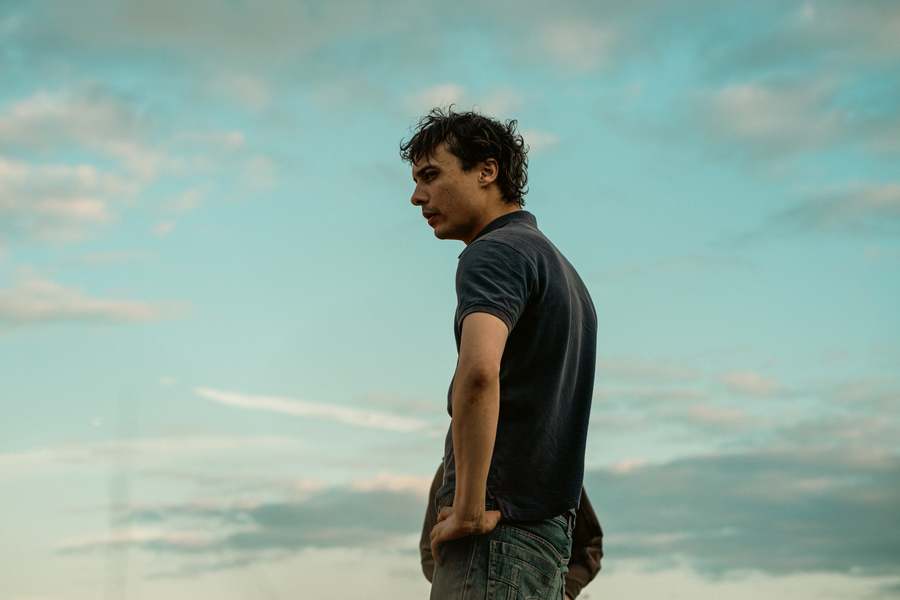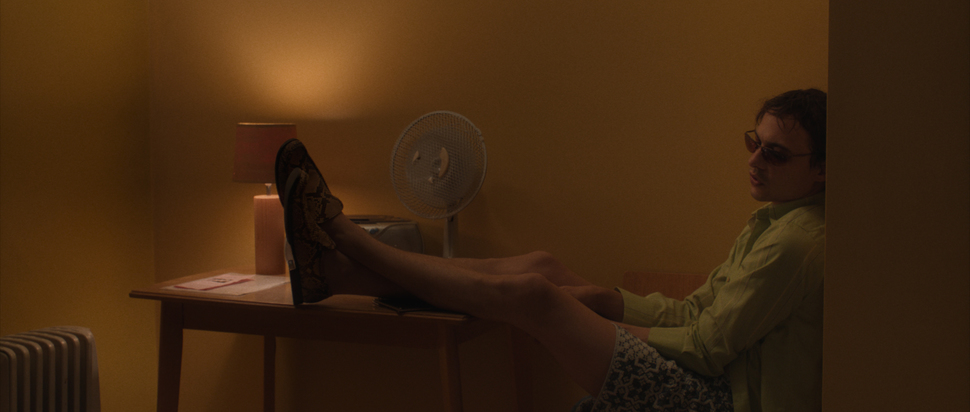Frank Dillane on his starring role in Urchin
Fear the Walking Dead star Frank Dillane gives a wonderful performance in Urchin, the debut film from Babygirl actor Harris Dickinson. We catch up with Dillane, who tells us about his character Mike – a young, homeless man trying to get by in London
There are many reasons to seek out Urchin, the film that marks the directorial debut of actor Harris Dickinson. It’s a deeply moving, sensitive and at times funny drama set in London following the odyssey of a young man who doesn't have a safety net and has found himself ricocheting between prison, temporary hostels and sleeping rough on the streets.
As an actor, Dickinson has shown great taste in directors. In his short career, the 29-year-old has worked with Ruben Östlund (Triangle of Sadness), Sean Durkin (The Iron Claw), Eliza Hittman (Beach Rats) and Halina Reijn (Babygirl). He was clearly paying attention on those filmmakers’ sets: Urchin is directed with much style and invention, borrowing from the British social realism tradition but finding a visual language that often goes to surprising and occasionally surreal places.
The chief reason to seek out Urchin, however, is the heartbreaking central performance from Frank Dillane, whose character Mike can go from sweet to euphoric to belligerent in a heartbeat. Dillane is hardly a complete unknown: he was a fan-favourite on The Walking Dead spinoff Fear the Walking Dead and was chilling as a teenage Lord Voldemort in Harry Potter and the Half-Blood Prince, but this performance, which won him the best actor award in the Un Certain Regard strand at Cannes this year, really puts him on the map. Ahead of Urchin’s UK release, we caught up with this talented 34-year-old to discuss his performance, working with Dickinson and what he hopes audiences take away from the film.
The Skinny: Both your parents (Stephen Dillane and Naomi Wirthner) are actors. Was acting always on the cards for you?
No, I tried desperately to pursue a different career. But acting was always on my mind, I guess. I always remember going to watch my dad or my mom in plays when I was younger. So I really knew what that world felt like and looked like, but there was a time back then when I really wanted to write and play music. So I remember trying to get into university, handing in all this poetry and literature, and trying to get into all these different places, and I just couldn't get into anywhere. And then on a whim, I did To Be or Not to Be in an audition for RADA, and, you know, I got in straight away, so there didn’t seem to be much else I could do, really. I'm not very good at lots of things. But I do really love acting.
What drew you to the part of Mike?
[Urchin]'s story was close to my heart. I've worked with [London-based homelessness charity] Single Homeless Project for a few years now, and I think there's an interesting story here to tell, of people who are not living the same sort of lives as we are, but their stories tend to be, often, much more extraordinary and much more interesting.
I also liked how the film seemed to be an investigation of the human soul. What is it to be human? What is it to be human if you take away everything that you and I would rely on in order to get through the day? So if you take away a house, if you take away family, take away friends, take away money, all these kinds of constructs that we need to cope – if you take them all away, what are we left with? And [Urchin] shows we're left with a human being who feels just like the rest of us.

Frank Dillane in Urchin
Urchin shows the reality of living without a safety net, but it doesn’t wallow in misery. There is a lot of hope and joy in the film, but what makes it so heartbreaking is how easily it is to lose all that when you’re in Mike’s situation.
You're absolutely right, there are a lot of ups and downs for Mike, a lot of hopes and failures. It's really, really exhausting not having a home, from what I've gathered. It's really, really tiring. You're always on the edge of disaster; the smallest thing can throw you into the deepest, darkest holes of misery. You know, if your phone gets stolen or if you lose a number or you have to get to Marble Arch from Mile End by a certain time, or this place closes. Everything is such high stakes.
There’s also lots of humour in the film – dark humour about class and the inability of the State to help Mike.
I think we tend to scapegoat our sick and our vulnerable people in our culture. We like to other people and kind of put the blame on them. I mean, you see it in England with this rise of Nigel Farage: 'It's the immigrants' problem. It's the homeless people's problem. It's the sick people, they're too weak,' or whatever it is. But to answer your question, you know, the world can be rather absurd, and a little bit slapstick at times, because it's so brutal out there. [Mike]’s life is slightly insane to you and me, who live these very cushty lives. So yes, there is certainly humour within the drama, because it can be so ridiculous, how difficult life can become when you get stuck in addiction, or you get stuck in an uncomfortable situation. So there's an air of absurdity and surrealism that I think we captured really well with this film.
The increased othering of people you mention really rings true. I mean, just the other day, a presenter on Fox News in the US suggested euthanising homeless people in New York.
Jesus, exactly. But there you go. And he's not joking either. That's the thing, that wasn't a joke. That was a serious suggestion. What did he say? 'Lethal anaesthetic. Yeah, just kill them.' I mean, it's absurd, it's awful. It's truly awful. But we scapegoat our sick and vulnerable because we don't want to look at our own vulnerability, I think.
This is such a full-bodied performance. You really give Mike a very specific energy and physicality. Can you talk about creating that performance?
Yeah, there were certain physical things I wanted to achieve with Mike, certain postures that felt right or felt wrong but looked right. Things like carrying a bag for 14 hours a day with all your stuff in, that hurts your back – it's exhausting. You're always on your feet, and your legs are tired. You’re also very stressed. So there's a certain amount of being just strung out. And he's fit as well. So, yeah, I did try to physicalise Mike as much as I could in order to live him. I remember painting Mike, or drawing him, and I remember I would allocate each part of his body a different trauma. So there would be a trauma in his right knee from that time that person said this to him, or a trauma in his elbow from the time that person tried to mug him. There was a trauma that he held here in his neck, like little memories that I tried to hold around his body.
How did Harris Dickinson compare to other directors you've worked with? Does the fact that he’s also an accomplished actor help?
I think looking back now at what we did and how we did it, I think it helped that he was an actor. I think he was able to understand what I was doing, and able to steer it in the direction that he wanted it to go. And, looking back now, I realise it was a big thing that he knew what an actor goes through... You know, acting is a weird craft. Don’t get me wrong, I love working with directors who are not actors, but there can be a disjoint between what they want and how they're going to get it. You know what? It's like a football manager who hasn't played football. They might not have the best man-management skills, because they know what a good footballer is, but they don't really know how to get it out of them. Like José Mourinho, you know? He knows how to get out of some people, but some people, he just can't get it out of them.
So who's Harris in this analogy?
Yeah, Harris is Jurgen Klopp in this analogy. No, Harris is Pep Guardiola. But yeah, it was very helpful, and Harris is a really good director, let me tell you. He knows what he wants. And I was thinking this last night, one thing I am so grateful to Harris for is that he knew what he wanted, and he knew when he got it, which is such a relief.
What would you like people to take away from Urchin?
I think we're entering into quite a dangerous area at the moment, where we are beginning to other people, like what we said about this Fox News presenter, 'let's just lethally inject them while they're sleeping.' We are sort of getting this idea that people are not people, which is the most dangerous idea I think human beings can grow in their heads: this idea that, you know, 'they have a different skin colour from me, so they must not feel the same as me'. Or, 'well, they're sleeping on the street, so they must like sleeping on the street'. I think once you cut off another person's humanity, you can do what you want with them and treat them however you like.
I speak about all this stuff strictly artistically – I have no authority or insight politically – but I hope this film opens people's emotions to the fact that that person who you are walking past right now, who you maybe are not even acknowledging... I'm not saying do anything different even, but just begin to understand that person is a human being, like you are a human being, and their situation feels for them how it might feel for you. That's what I hope the film achieves: a certain access to our own ability to empathise with human beings going through a rough time. And I think if we can begin there, then we can start to maybe change things. But until we accept their suffering as real and as real as your suffering would be, I don't see how we're going to get anywhere, really.
Urchin is out now via Picturehouse; screening at Glasgow Film Theatre and Cameo, Edinburgh from 3 Oct and Dundee Contemporary Arts from 17 Oct
